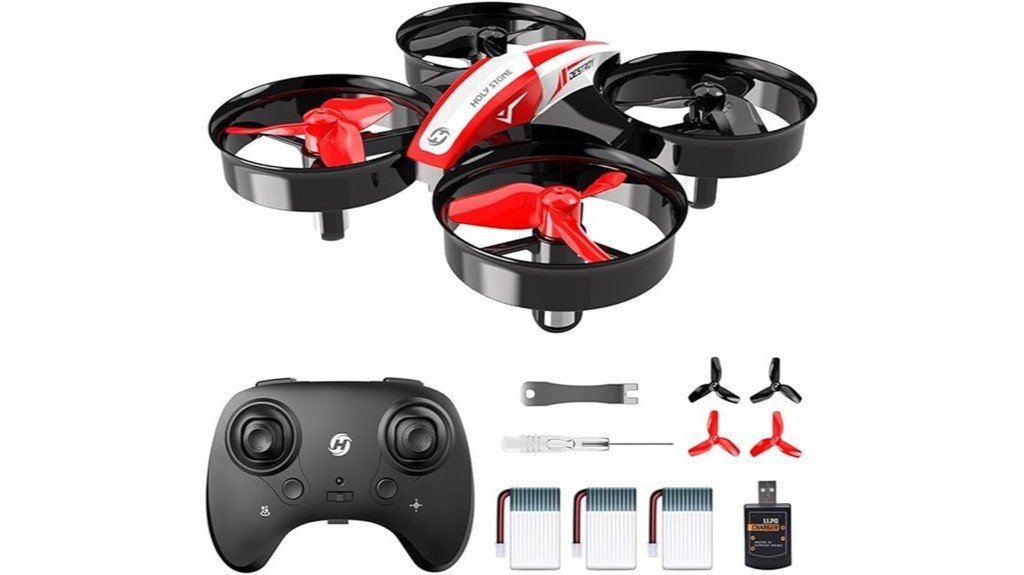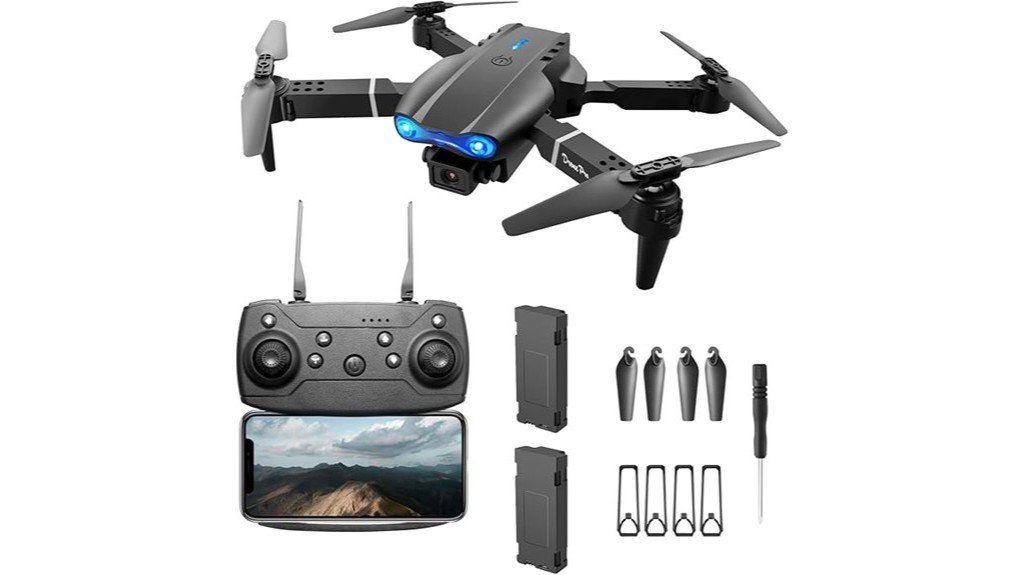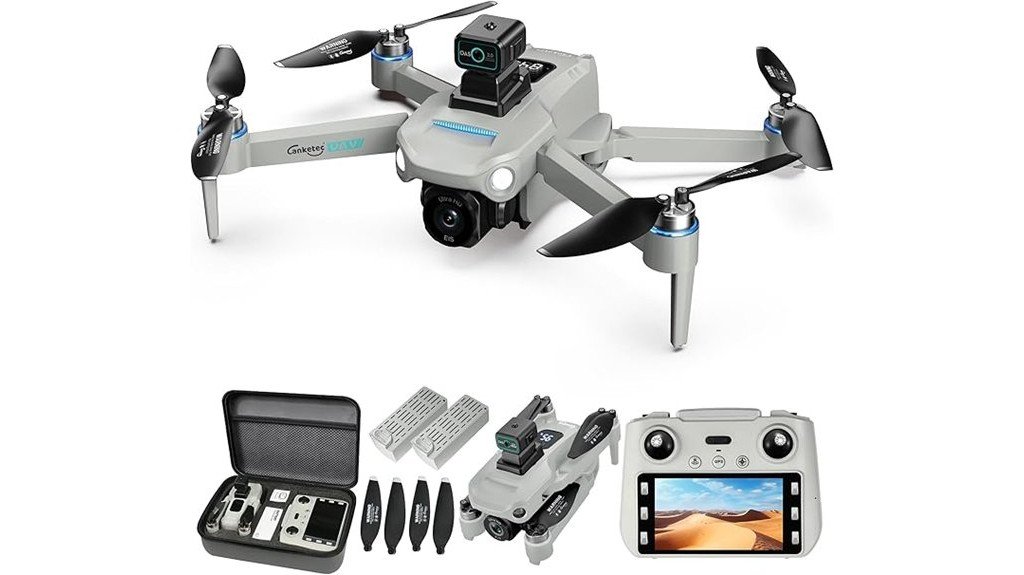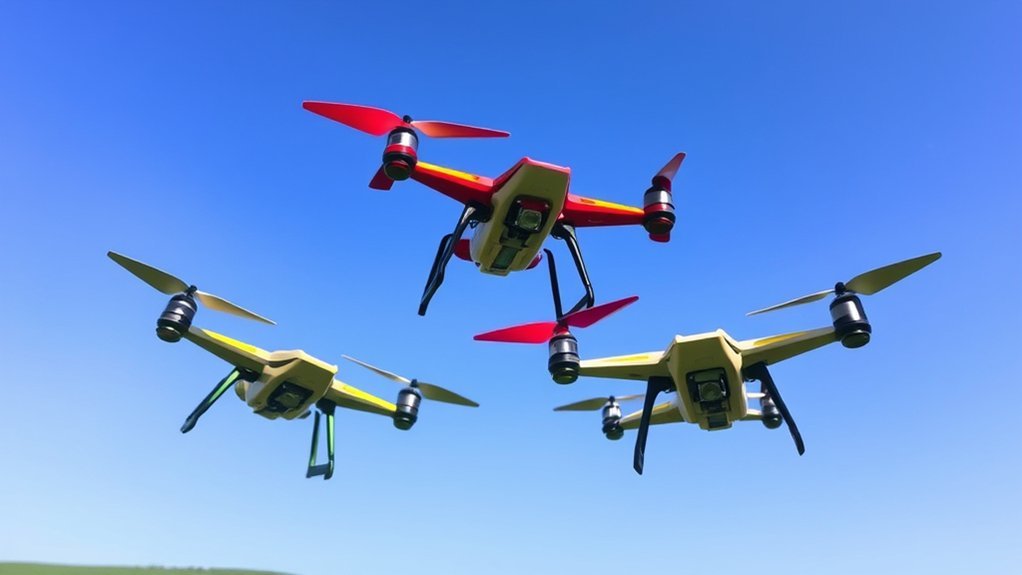Starting your journey into aerial photography doesn’t have to be intimidating. With the right tools, you can gracefully navigate the skies and capture stunning images. Whether you’re a kid enthusiastic to learn or an adult looking for the perfect gadget, there’s a drone that fits your needs. Curious about which models stand out for beginners? Let’s explore the top three options that will help you take flight with confidence.
Holy Stone Mini Drone for Kids and Beginners (HS210)

If you’re looking for an ideal starter drone for kids aged 8 and up, the Holy Stone Mini Drone HS210 is a fantastic choice. This compact quadcopter, weighing just 22 grams, is perfect for little hands. With features like toss-to-launch, altitude hold, and 3D flips, it keeps flying fun and engaging. You’ll appreciate its multiple speed modes, catering to varying skill levels. Plus, with three rechargeable batteries, you get around 21 minutes of flight time. Safety features like propeller guards make it durable for kids. Overall, it’s a reliable, entertaining drone that encourages learning through play.
Best For: The Holy Stone Mini Drone HS210 is best for kids aged 8 and up who are beginners in flying drones.
Pros:
- Easy to use with intuitive controls, perfect for novice flyers.
- Multiple speed modes and fun features like 3D flips keep the flying experience engaging.
- Durable design with safety features such as propeller guards, making it suitable for kids.
Cons:
- Short battery life of about 5-6 minutes per battery can be limiting.
- May experience drifting issues during flight.
- Lacks an on-off button, which could be inconvenient for users.
FPV Drone with 1080P Dual HD Cameras

The FPV Drone with 1080P Dual HD Cameras is perfect for both kids and adults who are new to flying drones. Its lightweight design and compact size make it easy to handle, while the dual 4K cameras capture stunning aerial shots. With features like gesture control, automatic takeoff, and obstacle avoidance, you can fly confidently. You’ll enjoy about 20 minutes of flight time and a remote distance of 120-150 meters. Plus, it includes two batteries for extended fun. Whether indoors or outdoors, this drone’s stability guarantees smooth experiences, making it an ideal choice for beginners like you!
Best For: Beginners and families looking for an easy-to-use drone experience with impressive camera capabilities.
Pros:
- Lightweight and compact design makes it easy to handle, perfect for beginners.
- Dual 4K cameras provide high-quality aerial photography and video.
- Obstacle avoidance technology enhances safety during flights.
Cons:
- Lightweight design may be affected by windy conditions, limiting outdoor use.
- Flight time of about 20 minutes per battery might not be sufficient for extended sessions.
- Remote distance of 120-150 meters may restrict exploration in larger areas.
Drone with Camera for Adults 4K Quadcopter

For adults seeking an accessible entry into the world of aerial photography, the Drone with Camera for Adults 4K Quadcopter stands out with its impressive 4K HD camera and 120° wide-angle lens. You’ll appreciate the upgraded 4.5-inch LCD screen controller for real-time imagery and flight data. Smart GPS technology guarantees features like Auto Return Home and Follow Me, making your flying experience intuitive. With two intelligent batteries providing up to 60 minutes of flight time, you can capture stunning footage. Plus, its foldable design and 5G transmission enhance portability and connectivity, ideal for beginners and seasoned flyers alike.
Best For: Adults looking for an easy-to-use drone with advanced features for aerial photography and videography.
Pros:
- 4K HD camera with a wide-angle lens for high-quality images and videos.
- Smart GPS technology promotes safe flying with features like Auto Return Home and Follow Me.
- Foldable design and lightweight construction enhance portability for outdoor adventures.
Cons:
- Customer ratings average at 3.6 out of 5, indicating mixed user experiences.
- Requires outdoor calibration before each flight, which may be inconvenient for some users.
- Limited technical support options may leave advanced users seeking more assistance.
Factors to Consider When Choosing an RC Drone for Beginners
When choosing an RC drone as a beginner, you’ll want to weigh several key factors. Consider the flight time, ease of control, and safety features, as these will greatly impact your flying experience. Additionally, think about camera quality and the drone’s portability, since they can enhance your overall enjoyment and convenience.
Flight Time Duration
Flight time duration plays an essential role in your RC drone experience, especially as a beginner. It dictates how long you can practice flying and enjoy your drone before needing a recharge. Most beginner drones offer flight times between 5 to 21 minutes, influenced by battery capacity and the drone’s weight. Keep in mind that rechargeable batteries typically take about 60 minutes to charge, which can impact usability if flight times are short. To maximize your flying sessions, consider drones that come with multiple batteries. This way, you can easily extend your time in the air. Also, factor in average flight time when planning outdoor sessions, particularly in windy conditions that may affect stability and control.
Ease of Control
After considering flight time duration, the ease of control becomes a key factor in selecting an RC drone as a beginner. Look for drones with intuitive controls and beginner-friendly features like one-key start/landing and altitude hold, which make flying simpler. Drones with multiple speed modes let you start slow and gradually increase speed as you gain confidence. Stability features, such as precise hovering and automatic takeoff, help you maintain control during flights, reducing frustration. Additionally, easy connectivity options like smartphone control or voice commands can enhance your experience and make operation more engaging. By prioritizing these elements, you’ll find a drone that’s not only fun to fly but also boosts your confidence as you learn.
Safety Features Importance
Choosing an RC drone isn’t just about fun; safety features are crucial, especially for beginners. Look for drones with propeller guards and emergency stop functions, as they help prevent accidents and guarantee safe landings. Many beginner-friendly models come equipped with built-in safety mechanisms that minimize crash risks, making them ideal for novice pilots. Features like altitude hold assist you in maintaining stable flight, reducing the chances of sudden drops or collisions. Automatic return-to-home capabilities provide peace of mind, guiding your drone back if the connection is lost or the battery runs low. Finally, obstacle avoidance technology enhances flight safety by preventing collisions in unfamiliar environments, giving you more confidence as you learn to fly.
Camera Quality Options
When you’re diving into the world of RC drones, camera quality is a key factor that can greatly enhance your flying experience. Look for drones with higher resolutions, like 4K, to capture clearer images and more detail for your aerial photography. If you want versatility, consider dual camera systems that include both standard and wide-angle lenses, allowing you to explore various shot types. For a good balance of quality and affordability, drones with 1080P HD cameras are perfect for beginners. Adjustable camera angles will let you experiment with different perspectives, improving your skills. Finally, drones with real-time image transmission (FPV) capabilities can help you navigate better and boost your piloting confidence.
Portability and Size
As you explore the world of RC drones, portability and size play an essential role in your decision-making. Opting for a compact drone, like the Holy Stone Mini Drone HS210, which measures just 3.15 x 3.15 x 1.18 inches, makes it easy to carry for various activities. Lightweight designs, such as the HS210 weighing only 22 grams, simplify handling and transport. Additionally, consider foldable models like the FPV Drone, which expands to 11 x 8.66 inches but folds down for convenient storage. Lighter drones, around 1.6 ounces, are easier to control and less affected by wind, critical for beginners. Mini drones also thrive in indoor spaces, enhancing your flying experience and confidence as a novice pilot.
Battery Life Management
Battery life management is essential for maximizing your enjoyment and practice time with your RC drone. As a beginner, you’ll find that flight times typically range from 5 to 21 minutes, depending on the model and battery capacity. Choosing a drone that comes with multiple batteries can greatly extend your flying time; some models offer up to 60 minutes of cumulative flight when swapping batteries. Keep in mind that charging usually takes around 60 minutes, which can affect your flying sessions. Understanding battery lifespan and performance helps you plan your activities better. To maintain peak performance, recharge your batteries after each flight instead of waiting for them to fully discharge; this practice extends their lifespan and guarantees consistent flying experiences.
Price Range Consideration
Selecting the right price range for your RC drone is essential, especially for beginners. Entry-level models generally fall between $20 and $150, making them accessible for casual users. Drones under $100 usually offer basic features like simple controls and limited flight times, while those in the $100 to $300 range provide advanced features like HD cameras and better stability. Don’t forget to take into account extra costs for spare batteries, accessories, and potential repairs, as these can quickly add up. Many affordable drones have shorter battery life, averaging only 5 to 10 minutes per flight, so budget for additional batteries. Remember, a higher price doesn’t always mean better performance—research user ratings and reviews to find the best value for your needs.
User Experience Level
How do you choose the right RC drone when you’re just starting out? Focus on drones with intuitive controls like one-key takeoff and landing, which make flying easier and help you learn quickly. Look for models with multiple speed modes, allowing you to start slow and build your confidence as you improve. Stability features such as altitude hold and propeller guards are essential for minimizing crashes and ensuring safer flights. Aim for drones that offer a flight time of around 5-6 minutes, giving you enough practice without feeling overwhelmed. Finally, pick a drone that includes emergency stop functions and easy-to-understand manuals to enhance your experience and make your journey into the world of RC flying enjoyable and stress-free.

